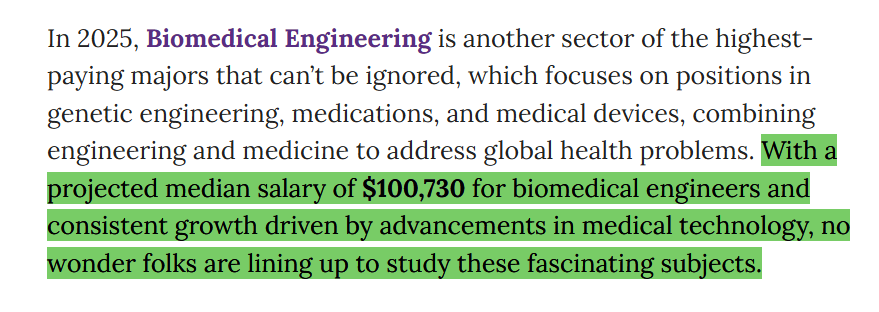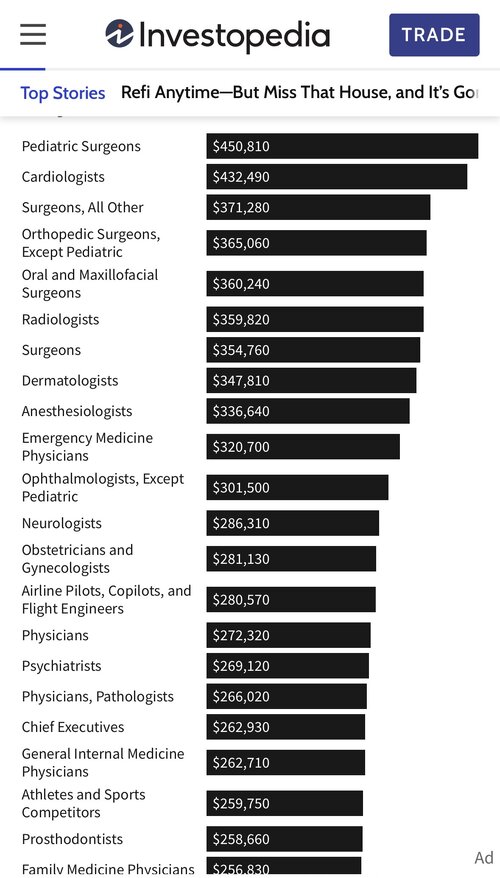holy
- Joined
- Nov 5, 2024
- Posts
- 954
- Reputation
- 1,688
I have researched current data on this because lifetime earnings projections shift pretty regularly, and I genuinely want to make sure I'm giving people on this forum, as retard as they are, actual numbers rather than guessing based on stuff from early 2025.
Specific data on the actual lifetime earnings and future trend adjustments have also been researched.
Here's what the data actually shows.
https://www.tamus.edu/data-science/...mic-major-and-occupation-on-lifetime-earnings
https://educationdata.org/college-degree-roi
https://www.bankrate.com/loans/student-loans/average-college-graduate-salary
https://www.hamiltonproject.org/data/career-earnings-by-college-major
https://global.nmsu.edu/blog/general/in-demand-college-majors-2025
https://www.nu.edu/blog/highest-paying-college-majors
https://www.bridgeport.edu/news/highest-paying-college-majors-in-2025
https://cew.georgetown.edu/cew-reports/valueofcollegemajors
https://www.aplu.org/our-work/4-policy-and-advocacy/publicuvalues/employment-earnings
https://poetsandquantsforundergrads...salary-projections-for-the-top-college-majors
I want to be real with you about this though. Most rankings you'll see just pull current salary data or static lifetime earnings.
Ranking university majors by projected lifetime earnings potential adjusted for future trends is kind of trickier because future trends aren't something we can predict with perfect accuracy.
So, I'll basically provide the majors at the top based on current lifetime earnings data, then talk about which ones actually look positioned for growth rather than stagnation or decline.

TIER 1: CLEAR WINNERS
Engineering, computer science, and related stem fields consistently dominate.

Software developers:

The demand keeps growing.
- AI
- Machine learning
- Cybersecurity
- Data engineering
These fields have structural reasons for expansion. Companies are investing heavily and will continue to for at least the next decade or so.
Similar story with biomedical engineering:

This one's solid long term too.
TIER 2: SOLID BUT WITH LIMITATIONS
Nursing anesthetists and nurse practitioners:

Specific data on the actual lifetime earnings and future trend adjustments have also been researched.
Here's what the data actually shows.
https://www.tamus.edu/data-science/...mic-major-and-occupation-on-lifetime-earnings
https://educationdata.org/college-degree-roi
https://www.bankrate.com/loans/student-loans/average-college-graduate-salary
https://www.hamiltonproject.org/data/career-earnings-by-college-major
https://global.nmsu.edu/blog/general/in-demand-college-majors-2025
https://www.nu.edu/blog/highest-paying-college-majors
https://www.bridgeport.edu/news/highest-paying-college-majors-in-2025
https://cew.georgetown.edu/cew-reports/valueofcollegemajors
https://www.aplu.org/our-work/4-policy-and-advocacy/publicuvalues/employment-earnings
https://poetsandquantsforundergrads...salary-projections-for-the-top-college-majors
I want to be real with you about this though. Most rankings you'll see just pull current salary data or static lifetime earnings.
Ranking university majors by projected lifetime earnings potential adjusted for future trends is kind of trickier because future trends aren't something we can predict with perfect accuracy.
So, I'll basically provide the majors at the top based on current lifetime earnings data, then talk about which ones actually look positioned for growth rather than stagnation or decline.

TIER 1: CLEAR WINNERS
Engineering, computer science, and related stem fields consistently dominate.

Software developers:

The demand keeps growing.
- AI
- Machine learning
- Cybersecurity
- Data engineering
These fields have structural reasons for expansion. Companies are investing heavily and will continue to for at least the next decade or so.
Similar story with biomedical engineering:

This one's solid long term too.
TIER 2: SOLID BUT WITH LIMITATIONS
Nursing anesthetists and nurse practitioners:

"But holy, don't these pay extremely well?"
Of course they do. Demand's high but it's also saturated in many regions.
Wage growth has actually been slower than people think once you account for cost of living adjustments + these require licensure and ongoing certification costs.
Business majors in finance:

Computer science majors:
But "business" is incredibly broad.
1. General business admin is getting softer.
2. Finance specifically, management consulting, is still strong but it's competitive and the salary growth plateaus faster than tech does.
TIER 3: RESPECTABLE BUT WATCH OUT
Communications majors:

BUT DO NOT BE FOOLED. They're actually trending downward in starting salaries.
Data science:

This is with decent growth, but this is getting crowded. Like, a lot.
Bootcamps pump out thousands of people into data roles annually. You'll need differentiation beyond just the degree.
Accounting and basic business admin fall into this category. Safe but not exceptional, and the automation threat is real (though probably 10+ years away).
TIER 4: AVOID UNLESS SPECIFIC
- Education majors offer the lowest lifetime roi at negative 55.43%
- Liberal arts at negative 42.78%
- Family and consumer science at negative 38.95%
These aren't universally worthless, but the default financial outcome is rough.
If you go this route (which I doubt you most likely will not) you need a specific vision.
WHAT ABOUT FUTURE TRENDS THAT MATTER?
Emerging shit like:
- Data science
- AI
- Renewable energy
- Environmental engineering
May not top salary charts today but show significant long-term earning potential and job security.
Also, the wild shit is that transferable skills like data analysis, leadership, project management, and digital communication boost earning potential across ALL industries regardless of degree choice.
"Holy, what does this mean?"
It means a history major who knows python and SQL might end up earning more than a generic business admin who doesn't.
This matters because the major alone doesn't tell the whole story anymore.
If I'm being honest about my own take here.
1. Tech adjacent fields (software engineering, data science, ML) are your safest bets for sustained growth. They're not oversaturated yet despite what people say.
2. Healthcare is reliable but the marginal growth is slower.
3. Pure business is crowded unless you're going to something specialized like consulting or investment banking.
4. And anything in liberal arts or education... yeah don't pick that shit.
2. Healthcare is reliable but the marginal growth is slower.
3. Pure business is crowded unless you're going to something specialized like consulting or investment banking.
4. And anything in liberal arts or education... yeah don't pick that shit.






